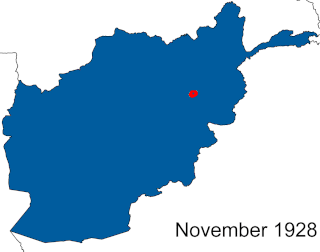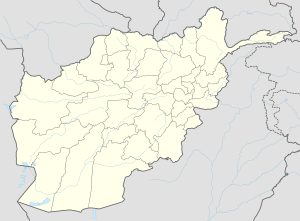
Kabul is the capital city of Afghanistan. Located in the eastern half of the country, it is also a municipality, forming part of the Kabul Province; it is administratively divided into 22 municipal districts. According to 2023 estimate, the population of Kabul was 4.95 million people. In contemporary times, the city has served as Afghanistan's political, cultural, and economical center, and rapid urbanisation has made Kabul the 75th-largest city in the world and the country's primate city.

The Revolutionary Association of the Women of Afghanistan (RAWA) is a women's organization based in Kabul, Afghanistan, that promotes women's rights and secular democracy. It was founded in 1977 by Meena Keshwar Kamal, an Afghan student activist who was assassinated in February 1987 for her political activities. The group, which supports non-violent strategies, had its initial office in Kabul, Afghanistan, but then moved to Pakistan in the early 1980s.

The Afghan Civil War was fought from 14 November 1928 to 13 October 1929. Rebelling, and subsequently governing Saqqawist (Saqāwīhā) forces under Habibullāh Kalakāni fought against various opposing tribes and rival monarchs in the Kingdom of Afghanistan, among whom Mohammed Nādir Khān eventually achieved a preponderant role. Despite early successes, such as the capture of Kabul and defeat of Amanullah Khan on 17 January 1929 or the capture of Kandahar on 3 June, the Saqqawists were eventually deposed by anti-Saqqawist forces led by Nadir on 13 October 1929, leading to Nadir's ascension as King of Afghanistan, who ruled until his assassination on 3 November 1933.

Afghanistan Liberation Organization is a Maoist political group in Afghanistan. It was founded by Faiz Ahmad and some others in 1973. ALO is one of several organizations that grew out of the Sholaye Javid movement. ALO was originally named Revolutionary Group of the Peoples of Afghanistan ; it was renamed in 1980.
Faiz Ahmad was an Afghan politician who led the Afghanistan Liberation Organization (ALO), a Marxist–Leninist organization established in Kabul.

Relations between Afghanistan and modern Iran were officially established in 1935 during Kingdom's Zahir Shah's reign and the Pahlavi dynasty's Reza Shah Pahlavi, though ties between the two countries have existed for millennia. As a result, many Afghans speak Persian, as Dari is one of the official languages of Afghanistan, and many in Afghanistan also celebrate Nowruz, the Persian New Year.

The Hazaras have long been the subjects of persecution in Afghanistan. The Hazaras are mostly from Afghanistan, primarily from the central regions of Afghanistan, known as Hazarajat. Significant communities of Hazara people also live in Quetta, Pakistan and in Mashad, Iran, as part of the Hazara and Afghan diasporas.

The Herat uprising, locally known as the Uprising of 24th Hūt was an insurrection that took place in and around the city of Herat in western Afghanistan, across several days in March 1979. It included both a popular uprising and a mutiny of ethnic Tajik Afghan Army troops against the Democratic Republic of Afghanistan (DRA). The communist regime at first appealed to its Soviet allies for help, but the Soviet leadership declined to intervene. After the insurgents seized and held the city for about a week, the regime was able to retake it with its own forces, and the subsequent aerial bombardment and recapture of Herat left 3,000 to 25,000 of its inhabitants dead. It was the worst outbreak of armed violence in the country in 50 years, and was the deadliest incident in the 1978-1979 period following the Saur Revolution and before the start of the Soviet occupation.
As a geographically fragmented state, Afghanistan is separated into as many as 14 ethnic groups that have historically faced divisions that devolved into political violence. This conflict reached its culminating point in the 1990s with the rise of the Taliban.

On 23 July 2016, a twin bombing occurred in the vicinity of Deh Mazang square in Kabul, capital of Afghanistan, when Enlightenment Movement protesters, mostly from the Hazara ethnic group, were marching against a decision to bypass their region in the development of the TUTAP mega power project. At least 97 people were killed and 260 injured. The terrorist group Islamic State of Iraq and the Levant claimed responsibility, however the same group later on refused it. Some Hazara protestors allege that Afghan president Ashraf Ghani was behind the attack. They believe that Ashraf Ghani government was abetting the terrorists who were responsible for the attack. They also allege that the government officials were preventing the wounded from being shifted to the hospital.

The 1888–1893 Hazara uprisings or genocide and displacement of Hazaras occurred in the aftermath of the Second Anglo-Afghan War when the Afghan Emirate signed the Treaty of Gandamak. Afghan Amir Abdur Rahman set out to bring the Turkistan, Hazaristan, and Kafiristan regions under his control. He launched several campaigns in the Hazarajat due to resistance to oppression from the Hazaras, culminating in the Battle of Uruzgan and he conducted a widespread genocidal campaign against its population.
The 3 Hoot uprising refers to a week of major civil unrest in Kabul, Afghanistan that started on 22 February 1980, occurring two months after the Soviet intervention. It is named after the date and month it started in the Solar Hijri calendar. Protests, rioting and a popular uprising against the Babrak Karmal-led Democratic Republic of Afghanistan government was triggered, by one account due to a series of mass arrests by the regime. Alternatively it has been said that the murder of Lieutenant Alexander Vovk, an instructor of the Soviet Komsomol, by an unknown gunman in the city, which led to the killing of civilians by a group of Soviet officers, led to the uprising.

Chindawol or Chendavol is a neighborhood in the older section of Kabul, Afghanistan.

Commander Shafi Hazara was an ethnic Hazara military commander in Afghanistan. He was a senior commander during the resistance of west Kabul and Hazarajat between 1991 and 1996. In the 1990s, he led Hezb-e-Wahdat’s “Brigade 2” military wing against rival militias and, against the Taliban takeover.

The Unai Pass or Onai Pass is a mountain pass on the western side of the Paghman Mountains in Jalrez District, Maidan Wardak Province, Afghanistan. It is of strategical importance due to its geographical location to the southwest of Kabul. The Sarchashma River flows through the pass, which is the upstream part of the Kabul River. The Maidan River, a tributary of the Kabul/Sarchashma rises at the pass at an altitude of about 3,300 metres (10,800 ft).
The Tabassum movement was a grassroots protest movement in Afghanistan that held several protests in Kabul and other Afghan cities in mid-November 2015, following the execution by an armed opposition group of nine-year-old Shukria Tabassum and six other Hazaras around 9 November 2015. The protests were ethnically diverse, had strong participation and leadership by women, and the organisational structure avoided concentration of leadership.
The Enlightenment Movement or Junbesh-e Roshnayi is a grassroots civil disobedience movement of Hazaras created in 2016 in Afghanistan in response to the Afghan government's change in routing plans for proposed international electricity networking, which was perceived as continuing historical anti-Hazara discrimination. The group organised major protests in Afghanistan and internationally during 2016 and 2017, protesting against discrimination. The group's youthful leadership challenged traditional Hazara leaders for representativity of the community.
Uprising for Change is an Afghan civil disobedience movement that started with tent sit-ins in central Kabul in June 2017 in response to the 31 May 2017 Kabul bombing, the killing of protesters by Afghan security forces on 2 June, the 3 June suicide bombings at a funeral of one of the 2 June victims, and subsequent police violence. On 11 June 2017, the commander of the Kabul Garrison, Ahmadzai, and Kabul police chief Hassan Shah Frogh were suspended from duty following the protests. In March 2018, Uprising for Change called for the Afghan government to be replaced by a six-month interim government.
Large-scale organized protests by students in the city of Kabul, Afghanistan, paralyzed the education system and led to heavy clashes. The uprisings by students took place from late April to early June 1980, demonstrating against the communist government of Babrak Karmal and the invading Soviet Union forces, calling for freedom and the withdrawal of Soviet forces. The protests were quelled and led to a large number of students being arrested, estimated between 400 and as many as 2,000. Between 72 and 200 students lost their lives in the demonstrations.

#StopHazaraGenocide is a social media campaign that aims to raise awareness and demand action against the persecution and violence faced by the Hazara ethnic group. The campaign was initiated by Hazaras in response to a series of deadly attacks on the Hazara community, especially students and women, by the Taliban and other extremist groups.













